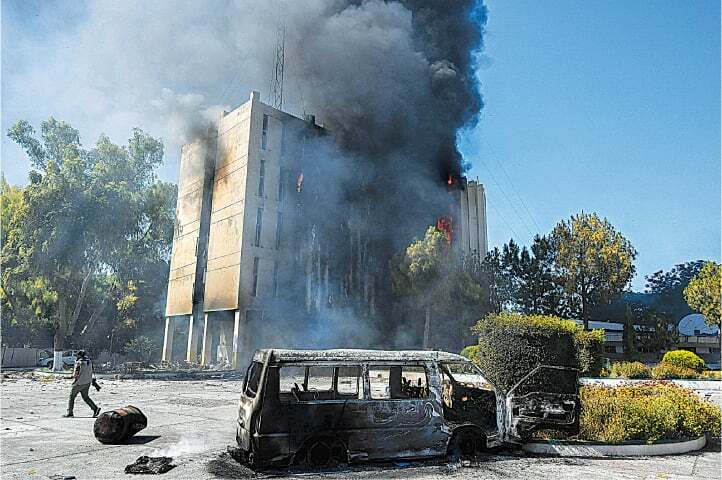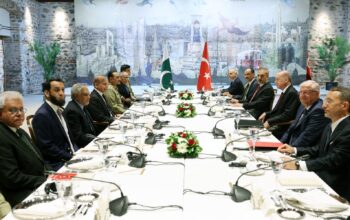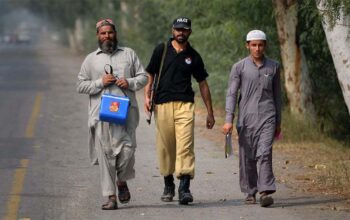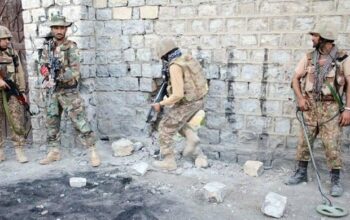By Staff reporter
ISLAMABAD: The government assured the country’s top court on Friday that it would not execute any civilians if convicted by military tribunals for their role in the violence that erupted on May 9 after the arrest of former prime minister Imran Khan on corruption charges.
But the government also sought more time from the Supreme Court of Pakistan to decide whether to grant the defendants a right to appeal their sentences in civilian courts.
Attorney General Mansoor Usman Awan said the convictions would not entail capital punishment or 14-year imprisonment, as the investigation was still ongoing and the relevant sections of the law did not allow for such sentences.
He also said that the reasons for the military courts’ decisions would be recorded and that the suspects would be allowed to engage the counsel of their choice.
However, some of the six judges hearing the case expressed doubts about the applicability and constitutionality of trying civilians by military courts, which were set up in 2015 to deal with terrorism cases after a deadly attack on a school in Peshawar.
The petitions were filed by lawyers and relatives of 102 Pakistan Tahreek-e-Insaf’s suspects who are in military custody and face trial under the Pakistan Army Act (PAA), which does not provide for an appeal before a civilian court.
Justice Yahya Afridi asked Awan what the government’s case would be if sections regarding entering into prohibited places were taken out, as they were not related to terrorism.
Justice Ayesha A. Malik also questioned how Awan could assure that no death sentence or 14-year imprisonment would be handed down to the suspects when he himself had stated that investigations were still on.
Justice Munib Akhtar observed that the Pakistan Army Act (PAA), under which the suspects were being tried, was designed for members of the armed forces who could be denied fundamental rights under the constitution, but not for civilians who had a right to due process and appeal.
“It seems as if the application of the fundamental right has been vested on the will of the state, but that would be a complete denial of the basic rights,” he said.
Justice Malik said the 21st Constitution Amendment, which enabled military courts to try civilians, had also provided certain safeguards by separating the judiciary from the executive.
Attorney General Awan said the issue of allowing appeals against military court verdicts had serious implications for cases such as that of Indian spy Kulbhushan Jadhav, who was sentenced to death by a military tribunal in 2017.
“This requires careful consideration in view of serious implications for having a direct bearing on cases like that of Indian spy Kulbhushan Jadhav or individuals held under the charges of espionage [and] declared enemy of the state,” Awan told a six-judge bench headed by Chief Justice Umar Ata Bandial.
He requested a month’s time to examine the matter, saying it could involve international consequences and require legislation.
Awan assured the court that no trial would commence without prior intimation to the Supreme Court and that the decisions of the military courts would be based on reasons, evidence and open hearings.
He also said that the suspects were kept in military units and not with hardened criminals and that they had access to their family members and private lawyers.
However, senior counsel Sardar Abdul Latif Khosa, who represented one of the petitioners, disputed Awan’s claims and said the suspects were living in pathetic conditions and some of them were unable to walk due to torture.
He accused the government of delaying the case to prevent a decision by the chief justice, who is due to retire soon.
Chief Justice Umar Ata Bandial said the court would note down Awan’s assurance in its order and would also consider appointing a retired judge or a group of advocates to inspect the conditions of the suspects.
He stressed that the independence of the judiciary was the cornerstone of the country’s justice system and that civilians tried by military courts should have a substantive right to appeal before an independent forum.
The hearing was adjourned until next week.
Copyright © 2021 Independent Pakistan | All rights reserved




